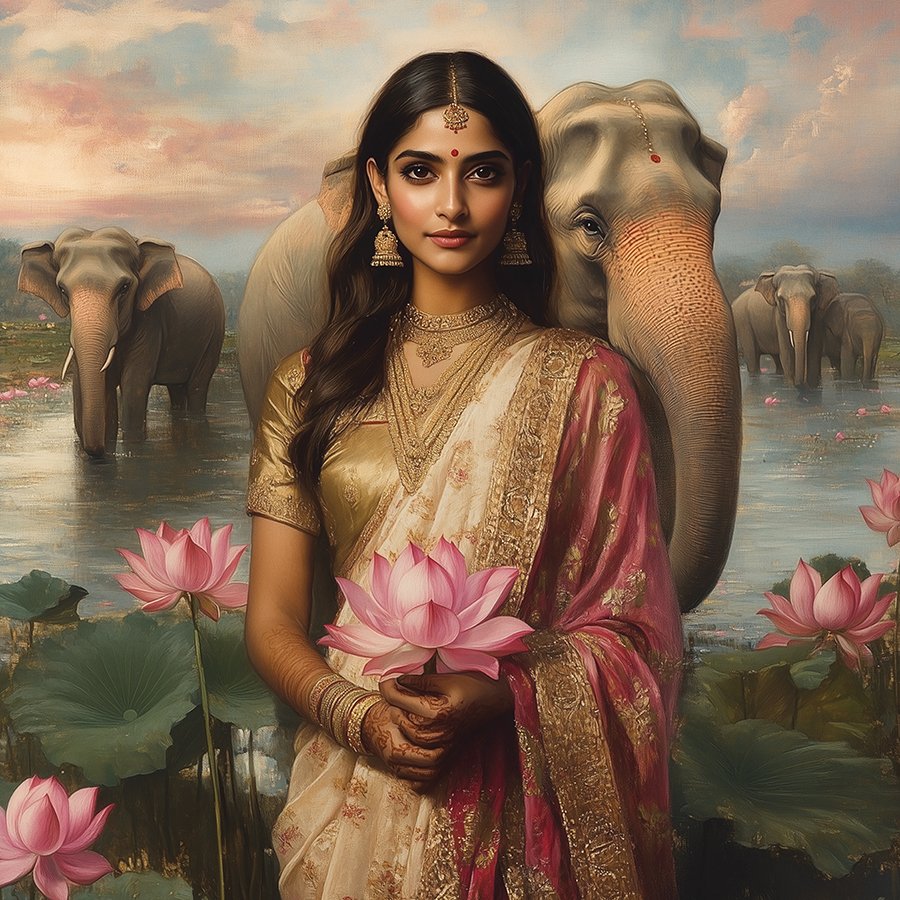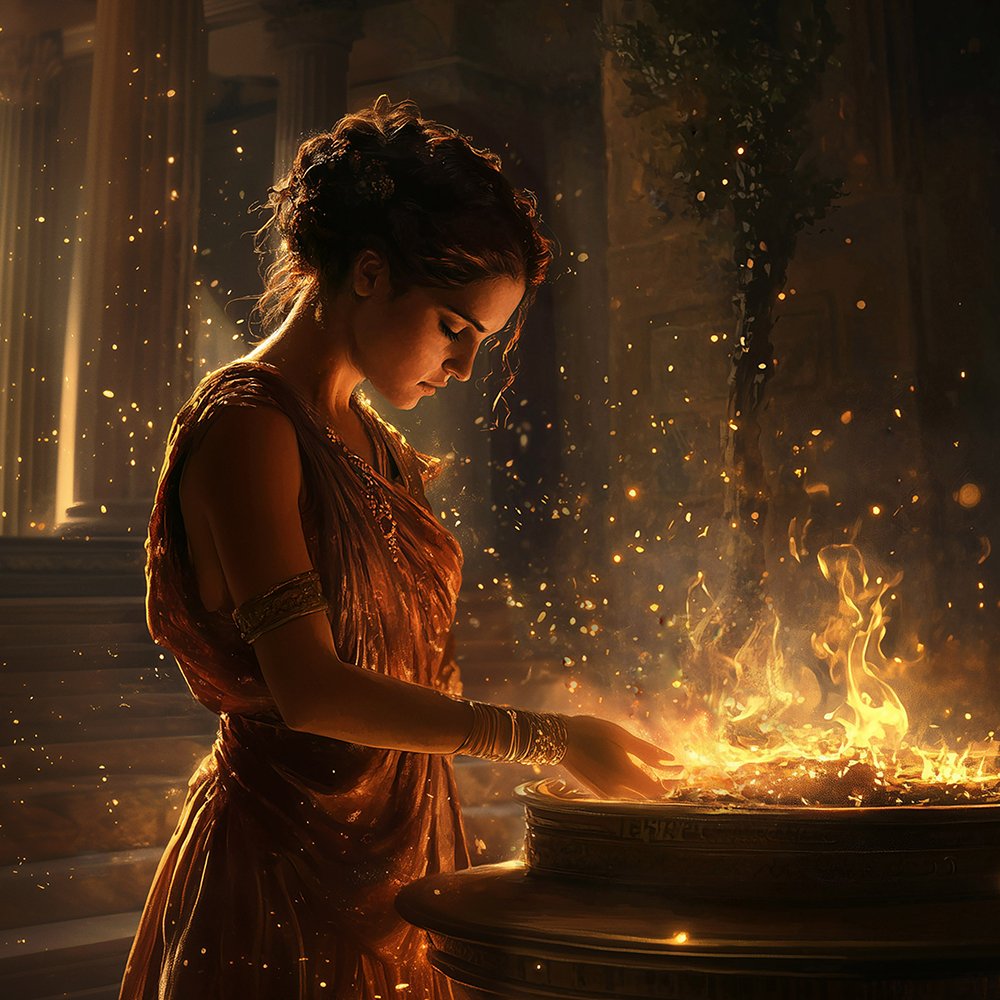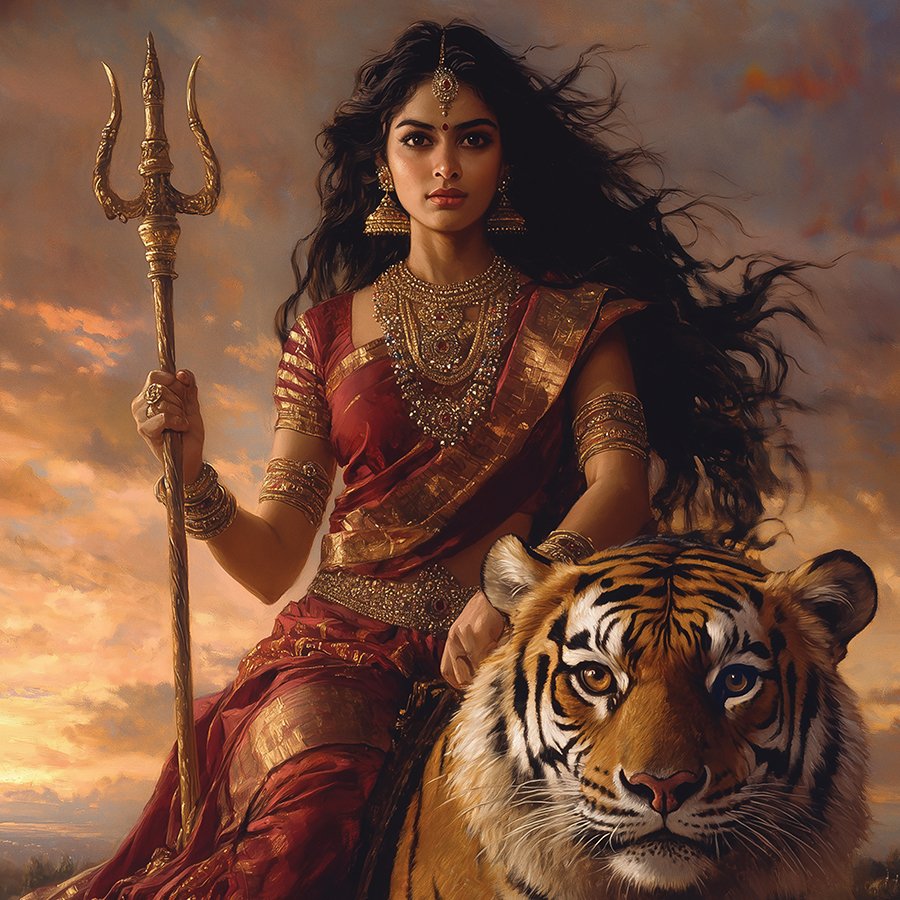Lakshmi
Durga, the fierce and powerful goddess of Hindu mythology, embodies the ultimate power of the divine feminine, riding into battle on a lion or tiger with unmatched grace and strength. Her story, rooted in the cosmic struggle between good and evil, serves as a timeless reminder of the indomitable force of righteousness and the inner strength that lies within us all. As a protector and spiritual mother, Durga's energy resonates far beyond myth, inspiring those who seek courage, transformation, and empowerment. Her legacy is a living narrative that continues to guide and uplift, reminding us that with unwavering faith, good will always triumph over evil.
Sekhmet
My rekindled love for mythology was ignited by Sekhmet, the ancient Egyptian goddess of the scorching desert sun, plague, chaos, war, and healing. Created from the sun god Ra's eye, Sekhmet embodies both destructive and healing forces, guiding me through spiritual challenges with her fierce energy. As a lioness or woman with a lion's head, she symbolizes strength and authority, serving as a protector and guardian of cosmic order. Her dual nature reflects the balance between creation and destruction, making her a profound figure in both ancient rituals and modern interpretations.
Hestia/Vesta
Athena, the revered goddess of wisdom, intelligence, and war, holds a significant place in ancient mythology. Known for her strategic mind and unwavering commitment to justice, she was often depicted in her warrior's armor, accompanied by an owl, symbolizing wisdom. Athena's unique birth story, emerging fully grown from Zeus's head, highlights her profound connection to intellect and rational thought. Her influence extended beyond warfare, as she was also a patron of the arts and crafts, embodying the ideals of wisdom, creativity, and civilization.
Isis
As the Mid-Atlantic bids farewell to summer’s heat and humidity, a cooler breeze signals the approach of autumn—a season rich with change and renewal. This transitional time, filled with childhood memories and the anticipation of the spooky season, feels empowering and magical. It brings to mind the cycles of life and death, growth and decay, echoing the story of Isis, the Egyptian goddess of motherhood, magic, and transformation. Isis reminds us of the importance of embracing change, finding strength in adversity, and connecting deeply with the rhythms of nature and life itself. As we honor her legacy, we are reminded of the beauty that can be found in both endings and new beginnings.
Durga
Durga, the fierce and powerful goddess of Hindu mythology, embodies the ultimate power of the divine feminine, riding into battle on a lion or tiger with unmatched grace and strength. Her story, rooted in the cosmic struggle between good and evil, serves as a timeless reminder of the indomitable force of righteousness and the inner strength that lies within us all. As a protector and spiritual mother, Durga's energy resonates far beyond myth, inspiring those who seek courage, transformation, and empowerment. Her legacy is a living narrative that continues to guide and uplift, reminding us that with unwavering faith, good will always triumph over evil.
Hemera
Hemera, the lesser-known Greek goddess of day, symbolizes the transition from darkness to light, heralding the dawn and awakening life each morning. As the daughter of Nyx and Erebus, Hemera plays a crucial role in Greek cosmogony, embodying light, hope, and renewal. Though her myths are few, her significance lies in what she represents—prosperity, vitality, and the enduring power of light over darkness. Hemera’s timeless presence continues to inspire, reminding us of the boundless potential each new day holds and the delicate balance between life and death.
Athena
Athena, the revered goddess of wisdom, intelligence, and war, holds a significant place in ancient mythology. Known for her strategic mind and unwavering commitment to justice, she was often depicted in her warrior's armor, accompanied by an owl, symbolizing wisdom. Athena's unique birth story, emerging fully grown from Zeus's head, highlights her profound connection to intellect and rational thought. Her influence extended beyond warfare, as she was also a patron of the arts and crafts, embodying the ideals of wisdom, creativity, and civilization.
Hathor
Hathor, a highly revered deity in ancient Egypt, embodied love, beauty, music, fertility, and pleasure, appealing to both women and men. Worshiped primarily in Dendera, her influence spanned from protection to afterlife care. As the wife of Horus and daughter of Ra, she symbolized maternal nurturing and divine queenship. Hathor’s legacy, including her connection to cosmetics and festivals, remains a significant part of Egyptian spiritual heritage.
Mictecacihuatl
Mictecacihuatl, the Lady of the Dead, is a pivotal figure in Aztec mythology, embodying the profound duality of existence. As the goddess of death and the underworld, she and her consort, Mictlantecuhtli, oversee Mictlán, guiding souls on their journey to the afterlife. Her skeletal visage, emblematic of the calavera imagery, is central to Dia de los Muertos, a festival celebrating life and honoring the deceased. Beyond Aztec culture, Mictecacihuatl's symbol of life and death resonates globally, encouraging a deep understanding of transformation and renewal.
Ix Chel
Ixchel, the Jaguar Goddess of Maya mythology, embodies the lunar cycles and the dual forces of creation and destruction. As the Moon Goddess, she symbolizes birth, growth, and renewal, with a deep connection to fertility, healing, and rain. Her association with jaguars reflects her power and role as a guide for souls in the spiritual realm. Often depicted with a serpent-adorned headdress, Ixchel's presence underscores the Maya people's profound understanding of life’s interconnectedness and the natural world.












